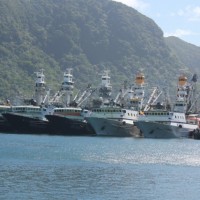
The bad news is another purse seiner that was based in American Samoa is moving to the Solomons. The good news is the rest are staying put.
Cape Fisheries whose boats fish for Tri Marine International has decided to transfer the Cape San Lucas to National Fisheries Developments (NFD) based in the Solomon Islands.
She will be flagged as a Solomon Islands vessel and continue to fish for Tri Marine.
Tri Marine spokesperson Heidi Happonen explains the primary motivation for this transfer is the increasing raw material needs for SolTuna – a tuna processing company also located in Noro, Solomon Islands that is majority owned by Tri Marine. Most of Cape San Lucas’s catch is intended for delivery at SolTuna.
According to Happonen, not only will this transfer help to meet SolTuna’s increasing demand for tuna caught by Solomon Islands flag vessels, but Tri Marine will also be able to benchmark the relative cost of operation for US vs. Solomon Islands flag vessels.
She says while they know that operation under US flag is costlier than under most other flags, the transfer allows their company to make a direct comparison, apples to apples, of the premium being paid for operation under US flag.
The Governor’s Fisheries Task Force has estimated each purse seiner generates up to $600,000 for the local economy per year from fuel sales, port fees, maintenance, and spending in hotels, bars, restaurants and travel agencies.
Local stevedores still struggling from the effects of purse seiners not fishing for several months due to the ban on fishing on the high seas last year, will also be impacted.
Happonen says they originally thought of moving two of their Pago-based boats to the Solomon Islands because of recent restrictions imposed on the high seas and other losses of fishing grounds for the American Samoa purse seiner fleet.
But there was a change of plans. And only the Cape San Lucas is moving.
Happonen said, “We are hopeful that this trend will reverse. So for now we are limiting this transfer to one vessel.”
The Tri Marine spokesperson says it’s important to note that changing the flag of a vessel does not preclude it from offloading in American Samoa.
She comments: While we are confident that there is enough fish to support American Samoa with the remaining fleet at this time, we also know that it will always be possible to divert the Cape San Lucas to Pago Pago if the fish is needed by the local canneries.”
KHJ News asked if Tri marine had any concerns about the local shipyard’s ability to repair purse seiners,
Happonen responded, “We have an ongoing dialogue with the management and we have been addressing all the issues. One of them is the lack of insurance coverage. The shipyard needs to have in place liability insurance in case of accidents. As it stands, if we put one of our boats in that shipyard and something happens to it, there is no insurance coverage.”
The cannery official acknowledges the territory’s limited resources.
She says, “Like most other Pacific Island Countries, American Samoa is a Small Island Developing “Territory,” and it largely depends on the tuna industry for its economy. The ASG is doing all that they can to help the tuna industry, and we are grateful for the sense of partnership and the increased level of support and understanding that the Governor and his team continue to demonstrate.”




